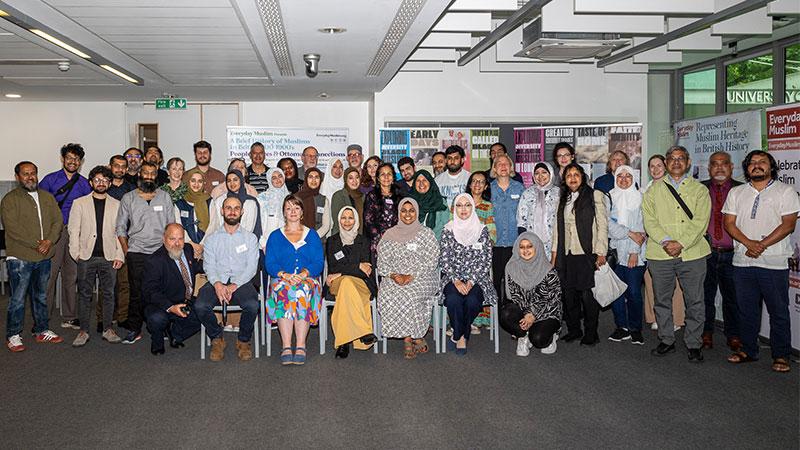The University of Westminster has hosted the Muslims in Britain: 1800-1970 and Beyond conference, which drew an array of Master's and PhD students, scholars, historians, heritage and media professionals, community activists and archivists from around the UK to discuss and reflect on the rich history of Muslims in Britain.

This national conference was part of the Westminster Conversations series organised within the University’s EDI Community and Communities programme, which is supported by the Quintin Hogg Trust. It was organised in partnership with Sadiya Ahmed from the archive and oral history project Everyday Muslim, and Hafza Iqbal and Samuel Bartlett from the Muslims in Britain Research Network (MBRN).
The official opening words were delivered by representatives from Westminster: Professor Dibyesh Anand, Deputy Vice-Chancellor of Global Engagement and Employability, Sobia Razzaq, Senior Lecturer in Law and Co-chair of Women of Westminster (WoW), Zahrah Surooprajally, EDI Programme Manager, and Professor Sariya Cheruvallil-Contractor, Chair of MBRN. Together they emphasised the importance of exploring the historical and cultural journey of British Muslims.
Following the welcome, MBRN launched their new membership programme, alongside their Annual General Meeting (AGM), marking a significant step towards strengthening the network's capacity to support research and collaboration.
The first day featured a plenary session by Abdul-Azim Ahmed, who provided insights into the historical development of Welsh Muslim communities. A panel on Sufi communities explored their influence and narratives in the UK, while discussions on contemporary trends led by Everyday Muslim Heritage and Archive highlighted digital archiving projects and community-academic partnerships. The day also included presentations on ethnocentric dynamics within British Muslim communities and travel writing, emphasising collaboration and creative approaches in documenting history.

The second day began with a session on the contributions and experiences of Muslim women in Britain from 1850-1950, shedding light on often-overlooked aspects of history. Panels on British Muslim arts and migration examined the contributions of Muslim artists and the diverse experiences of Muslim migration and travel. Biographical studies highlighted personal histories, including the story of Ayuba Suleiman Diallo and early Shi’a Muslim spaces in Britain. Discussions on Muslim female agency and religious marriage laws showcased the resilience of Muslim women in navigating social and legal frameworks.
The conference concluded with new cross-sector connections and calls for ongoing research and dialogue to fully appreciate the complex history of Muslims in Britain. Attendees left with a deeper understanding of British Muslim histories and a keen interest in future events and research opportunities.
Sadiya Ahmed, Founder of Everyday Muslim and Committee member of MBRN, said: “This conference has enabled Everyday Muslim’s aims to nurture cross-sector collaboration and to strengthen our collective purpose of developing primary resources and a point of historical reference to provide an authentic representation of the lives and experiences of Muslims in Britain, past and present.”
Zahrah Surooprajally added: “This partnership reflected our aims of the EDI programme to empower communities and celebrate representation.”
Find out more about upcoming EDI events at the University of Westminster.




